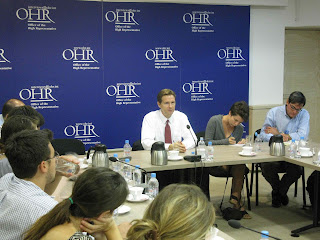Home in Cairo
The Jordan-Turkey Dialogue has finished, in terms of our collective time on the ground and in the field, for our reporters, photographers and socio-political analysts. The students all still have some work for me - mostly finalizing their Reflection papers and debriefings; that will give me a ton of work - when I receive 32 such papers (each around 2,400-2,500 words per paper) and have to finalize their grades within a week.
I'm also starting to prepare my first couple of lectures for the Balkans Dialogue, preparing as well for our first days on the ground in Belgrade, and preparing for the financial side of the Dialogue as well.
All in all, a busy time. But it's Cairo, and I'm with my wife, and our days are full of work, albeit at our own pace and in the overall setting of Egypt - a "naturally" slower pace for all.
I've not even been here a week, yet I'm finding things distinctly different from my last visit - February 19-28, and the glory days after the 'Revolution' and the fall of the Mubarak Dynasty (he and his sons are still in jail and/or "hospital arrest").
Tourists are nowhere to be seen - so Egypt continues to take a huge hit to its economy. Security (especially on the outskirts of Cairo, and in the wee hours of the night/morning) is "iffy". I don't see such problems where we live, but still, the streets of Zamalek at night are not what they used to be - packed with people all times of the day and night; American and other foreign students wandering around the cafes (or wandering anywhere - I just don't see many here at all this summer); and the "Arabs" (as in Gulf Arabs who usually swarm to Cairo in summer) are not here in any numbers.
I find that Egyptians generally are less "Egyptian" these days - less joyful, joking, welcoming, happy-go-lucky, kind, generous. I don't mean they don't have these characteristics anymore; I mean I just don't see them as readily. They are somehow below the surface - but once the conversation gets going, they resurface (alHamdu lillah!)
The economy is depressed, and I take that as a reason why I see people similarly "depressed" (or at least repressing their traditional happiness and hope-against-despair attitude, as I have otherwise observed these past 27 years here).
And yet there is hope. There is a clear desire for better security, to bring back tourists and business; there is hope for some return to normalcy, i.e., a "new normalcy" once elections happen - but when will they actually happen? I hear more talk about the coming of Ramadan (first days of August) than I do about elections.
Istanbul exhibited more election-madness than Cairo has ... but I guess it's unfair to compare. Egyptians are still building a democratic system (Turkey has had one for decades).
So what are they waiting for? yalla! Let's go.
I'm also starting to prepare my first couple of lectures for the Balkans Dialogue, preparing as well for our first days on the ground in Belgrade, and preparing for the financial side of the Dialogue as well.
All in all, a busy time. But it's Cairo, and I'm with my wife, and our days are full of work, albeit at our own pace and in the overall setting of Egypt - a "naturally" slower pace for all.
I've not even been here a week, yet I'm finding things distinctly different from my last visit - February 19-28, and the glory days after the 'Revolution' and the fall of the Mubarak Dynasty (he and his sons are still in jail and/or "hospital arrest").
Tourists are nowhere to be seen - so Egypt continues to take a huge hit to its economy. Security (especially on the outskirts of Cairo, and in the wee hours of the night/morning) is "iffy". I don't see such problems where we live, but still, the streets of Zamalek at night are not what they used to be - packed with people all times of the day and night; American and other foreign students wandering around the cafes (or wandering anywhere - I just don't see many here at all this summer); and the "Arabs" (as in Gulf Arabs who usually swarm to Cairo in summer) are not here in any numbers.
I find that Egyptians generally are less "Egyptian" these days - less joyful, joking, welcoming, happy-go-lucky, kind, generous. I don't mean they don't have these characteristics anymore; I mean I just don't see them as readily. They are somehow below the surface - but once the conversation gets going, they resurface (alHamdu lillah!)
The economy is depressed, and I take that as a reason why I see people similarly "depressed" (or at least repressing their traditional happiness and hope-against-despair attitude, as I have otherwise observed these past 27 years here).
And yet there is hope. There is a clear desire for better security, to bring back tourists and business; there is hope for some return to normalcy, i.e., a "new normalcy" once elections happen - but when will they actually happen? I hear more talk about the coming of Ramadan (first days of August) than I do about elections.
Istanbul exhibited more election-madness than Cairo has ... but I guess it's unfair to compare. Egyptians are still building a democratic system (Turkey has had one for decades).
So what are they waiting for? yalla! Let's go.



Comments
Post a Comment